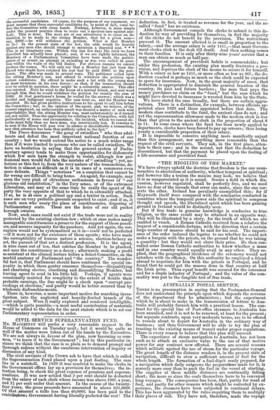CIVIL SERVICE SUPERANNUATION FUND.
MACIRTNEY Will prefer a very reasonable request to the House of Commons on Tuesday next ; but it would be quite as well if the matter were taken out of his hands by the Executive. We are not always in favour of the plan, now becoming so com- mon, "to leave it to the Government "; but in this particular in- stance we think that the case is so plain as to demand prompt and thorough redress without the cumbrous intervention of inquiry or discussion of any kind.
The civil servants of the Crown ask to have that which is called the Superannuation Fund placed upon a just footing. The case lies in a nutshell. In 1829 it was resolved to make the clerks in the Government offices lay up a provision for themselves; the in- tention being, to check the great expense of pensions and superan- nuation,. It was now settled that 5 per cent should be deducted from the salary of each clerk whose income was above 100/. a year, and 21 per cent under that amount. In the course of the twenty- four years, the gross proceeds have amounted to above 621,000/. Of that Amount a trifle less than 40,000/. has been paid to the contiihu$orat. Government having literally pocketed the rest ! The deduction, in fact, is treated as revenue for the year, and the w- eaned "fund" has no existence.
Although Government compels the clerks to submit to this de- duction by way of providing for themselves, in fact the majority of the clerks do not benefit by the provision. The restrictions prevent it. The amount allowed is so small in proportion to the salary,—and the average salary is only 141/.,—that most Govern- ment clerks stick to the desk till death. And then nothing comes to their families. It is only after thirty-nine years' service that a man can obtain so much as half-pay.
The encouragement of provident habits is commendable ; but under this profession, the existing plan mostly frustrates a pro- vision, and deprives the clerk of the means to secure it for himself. With a salary so low as 1411., or more often so low as 86/., the de- duction exacted is perhaps as much as the clerk could be expected to spare for insurance. Now, in the great majority of cases, that deduction is appropriated to diminish the general taxation of the country, its past and future burdens ; the man that pays the money purchases no claim on the "fund," but the sum which he might have devoted to insurance is wrested from him by the State. We have stated the case broadly, but there are certain aggra- vations. There is a distinction, for example, between officials ap- pointed since 1829 and those appointed before that date. The modern class contribute to the fund, the ancient class do not ; and yet the superannuation allowance made to the modern clerk is less than that given to the ancient clerk in the proportion of about 8 to 11. In some eases where the fund has been newly applied to departments, clerks have been forced to pay up arrears; thus losing yearly a considerable proportion of their salary.
It is impossible to conceive anything more manifestly unjust than this arrangement, nor anything more reasonable than the request of the civil servants. They ask, in the first place, atten- tion to their case ; and in the second, not that the deduction be discontinued, but that the payment be placed upon the footing of a life-assurance and provident fund.


























 Previous page
Previous page